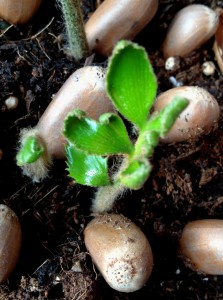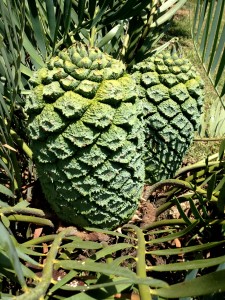Cycads belong to an ancient group of plants known as gymnosperms. A number of other well known plants belong to this group including pine trees, yellowwoods, Ghinko & Welwitschia. Fossil evidence of cycads dates them back to 250 million years ago! Three families of cycads exist today: Cycadaceae, Stangeriaceae & Zamiaceae.
Stangeria eriopus, belonging to the family Stangeriaceae, is a monotypic genus. This plant has a sub-terranian stem & ‘fern-like’ leaves and comes from a limited range in the Eastern parts of South Africa.
Encephalartos cycads belong to the family Zamiacea & this genus is found only in Africa, with around 40 species endemic to South Africa.
Cycads are dioecious, meaning that male & female cones occur on separate plants. Most species are hardy, drought tolerant plants & occur naturally over a wide range of habitats. Those found in hot dry regions often tend to have blue/grey leaves as an adaption to the sun & heat, those occurring in semi shade & forests have longer broader green leaves as an adaption to the cool & shady conditions, while grassland species have fine leaves & have also adapted to survive regular fires. Cycads are very rewarding plants to grow & are prized by collectors & landscapers as the make stunning feature plants & require very little maintenance.
Many species are threatened & some are extinct in nature partly due to the muti trade as well as illegal collection due to their high demand by collectors. We have a large pollen bank & are actively involved in pollinating plants in our own & other private collections. It is important to us to propagate & make these plants available while ensuring that not just the species, but the forms withing the species remain true. We have a large variety of Encephalartos species available, including rare South African species.
We are in the process of updating our website & will provide more information on pollination, identification, pests, etc soon!

